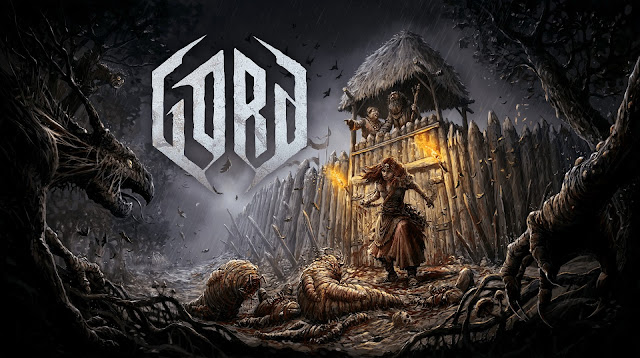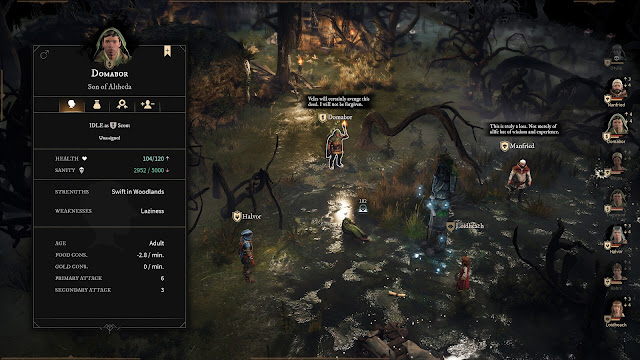Gord by developer Covenant.dev and publisher Team17 and
Fireshine Games—Microsoft Xbox Series X review written by Nick with a copy
provided by the publisher.
Estimated reading time: 5 minutes
Gord was one of those titles that caught my eye as soon as
it was announced. While it does not deliver quite as much depth as I was hoping
for, this hybrid action / strategy title boasts considerable atmosphere and
enough good ideas to balance out the title’s flaws.
The narrative and atmosphere are the real standouts here,
and Gord got off to a strong start with me. As the elder of the Tribe of the
Dawn, our protagonist must venture into nearby lands that are lost to
a dark corruption that sets the stage for this Slavic-theme adventure. It’s an
interesting premise that is aided by a game overall presentation. For example,
I never found the visuals to be particularly impressive, but they were
effective. The graphics themselves are often simple, and the engine is far from
a technical marvel, but the use of lighting and the eerie sense of dread
looming over the proceedings never really let up. That could almost be seen as a detriment as the sense of dark, suffocating dread can become almost wearisome
after a time.
The music is simple enough and not particularly memorable
for any particular tune, but it complements the setting and visuals nicely. The
story itself is told through a combination of animated scenes and stationary
images. I appreciated that the story itself was solid and that the voice actors
were convincing in their roles. These pillars help to prop up the presentation,
despite some of its rougher edges.
At its core, Gord is primarily a strategy game, but it has
elements of other genres laced into its DNA. You have tribe members with
specific jobs such as gathering supplies or venturing out into the corrupted
darkness to explore and reveal more of the land. The micromanagement aspects
are pretty well-balanced, as I seldom felt as though I was just overseeing too
much at any one time. The claustrophobic nature of Gord serves to ramp up the
creepy, about-to-be-overwhelmed atmosphere also keeps the settlements tight
with workers who generally go about their jobs without a lot of oversight. It
helps that the chapters themselves are pretty reasonably sized. That doesn’t
make them easy, just a bit more compact like much of the aforementioned
gameplay.
The actual city-building is standard enough stuff I’ve seen
in numerous other games. You gather the resources and knowledge to erect
structures that provide a myriad of benefits that help to counteract the
dangers of the world being explored. It’s a perpetual game of tug-of-war, where
the resources needed for these advancements are found in the wilderness, but so
are the dark entities looking to cause your people harm. However, without these
resources and village enhancements, you won’t survive your objectives nor the
game’s more difficult bosses.
Outside of the city sim genre, there’s a real-time element
to the combat (though it can be paused to do some strategizing), and also a
strong survival vibe throughout. You have to not just protect the village’s
bodies, but their psyches as well. They need to be comfortable, and there are
horrors that when seen, can impair their sanity, which can have an impact on the
citizens. The horrors of the world can come at you in a variety of different
ways, from finding something unsettling out in the woods with one of your scouting
parties, to your handling of a lose-lose decision, such as offering up a baby
to appease an otherwise deadly boss who might wipe you out. We’ve seen this
sort of ‘sanity’ metric in plenty of other games, and sometimes it can be hit
and other times it is a miss. I’d say by and large it works pretty well within
the Gord ecosystem.
One of the areas Gord struggles a bit more is in the
interface. There’s just a whole lot happening, and while I’ve mentioned how it’s
to the game’s advantage that it’s a compact game where you’re not managing
massive armies, it can still be unwieldy to get around. Gord was designed for
PC and it shows, as I have to imagine it would work better with a mouse and
keyboard. The controller works, and it’s functional, but hardly ideal. This
imprecision shows up in both camera controls and just the somewhat menu-heavy
interface that has you clicking through a lot of things.
In terms of modes, Gord sports the aforementioned campaign.
It’s broken up in logical, easy-to-digest bites and given the story that I
found quite entertaining, it’s a great way to play. However, there is a Custom
Scenario mode as well, and you have a great deal of agency over how it plays
out. This is a great way to experience the game outside of its narrative
structure.
Gord is one of those titles that tries to do several things,
blending some genres together and trying to create something unique. By and
large it succeeds. The various different pieces work well with one another, but
as is often the case when you try to do several things well, you have a
tendency not to do any of them great. To that end, the city building and strategy
sections are not as deep as they could have been. While the presentation and
interface have numerous rough edges, I adored the dark fantasy setting and how
engaging the narrative was.

















0 comments:
Post a Comment